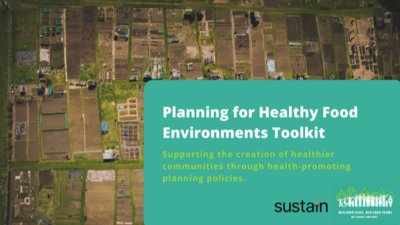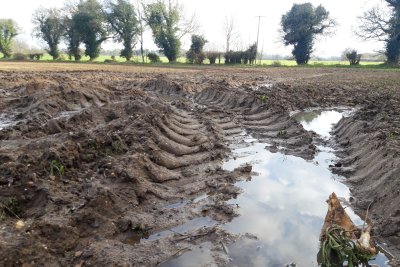Healthier communities through better planning
From including edible spaces in new developments to restricting new hot food takeaways or earmarking space for new growers or good food infrastructure, the planning system has a central role in supporting healthier communities. Nicola Calder considers how a new toolkit for planners, developers and communities can help promote healthy food environments across the UK.

The ‘Planning for Healthy Food Environments’ toolkit launched this month, supports the creation of healthier communities through health-promoting planning policies, the cross-collaboration of Council departments, and provides a series of case studies from across the Northwest region of England. The resource aims to highlight the different ways in which planning can support healthier environments.
The ability to access healthier food is a social issue as well as a public health issue. We all know too many neighbourhoods where it’s all too easy to access unhealthy food and there’s hardly anywhere you can access healthy food at an affordable price such as fresh fruit and vegetables. This puts a huge toll on the health and wellbeing of communities. Tackling access to food can meet several objectives including physical and mental health, climate change, community cohesion and biodiversity.
A good food environment connects food growers, producers, and consumers. Planning can help to control the proliferation of poor-quality food as well as encourage access to healthy food. Supportive planning policies can encourage good food businesses.
Healthier Place, Healthier Future (HPHF) Programme
The concept for the toolkit was developed initially as a resource for Local Authorities across Pennine Lancashire in the North West of England, through delivery of The Healthier Place, Healthier Future (HPHF) Programme. This is one of five national childhood obesity programmes, funded by the Department of Health and Social Care (DSHC) and delivered by the Local Government Association (LGA). The project is funded for three years (until summer 2022). The programme is one of a number of commitments made in the Childhood Obesity Plan; Chapter 2 published in June 2018. There are five other trailblazers across the UK: in Bradford, Birmingham, Lewisham, and Nottingham.
HPHF is being delivered by Food Active, working with the Pennine Lancashire Consortium of Local Authorities (Burnley, Blackburn with Darwen, Hyndburn, Pendle, Ribble Valley, Rossendale). Trailblazer programmes take a ’test and learn’ approach, to enable councils to spearhead and pilot innovative action in their local community to tackle high levels of childhood obesity.
The project works across four key levers and with a diverse range of stakeholders including officers and Elected Members from county council, district councils, a unitary authority and a wide range of partners across the public sector, third sector and also businesses.
The HPHF Programme delivery focuses on four themes (or levers):
- System leadership, to harness the support and power of the 250+ elected members in Pennine Lancashire, including those without a statutory focus on health.
- Businesses, to support a healthier retail programme of food offers via incentivisation and rewards.
- A social movement, working at a grassroots level to advocate for healthier food options.
- Planning, to test planning powers to restrict food retailers that do not offer healthier options and to test a range of levers to incentivise them to improve their offer.
“We will use a positive approach to planning regulation which actively promotes a healthier food environment in all our districts.” (HPHF)
The work associated with the planning lever aims to address some of these issues and has enabled collaborative working across the consortium. Working with planning authorities to support a healthier place by aligning policy across the Boroughs and working with the planning system to support public health.
Specific planning activities of the Trailblazer include developing joint agreements (JPA) that outline how planners are working to develop healthier places; Planning for Health Supplementary Planning Documents (PfH SPD); supporting community engagement in the planning system; engaging Elected Members in the planning process; undertaking research on hot food applications and policy decisions (with reference to health); and, contributing to national and local events on planning for health.
The ‘Planning for Healthy Food Environments’ toolkit
The toolkit has been produced as a resource to supplement the Pennine Lancashire ‘Joint Commitment to Planning for Healthy Weight Environments’, by offering practical examples of how healthy food environments can be achieved. The co-produced joint commitment or JPA sets out an agreed vision and set of core principles to be considered by planning colleagues, working in partnership, to build sustainable, healthy environments. The commitment draws on the legislative and regulatory provisions of the planning system and the local plan as key delivery tools for improving health.
The toolkit aims to highlight the different ways in which planning can support healthier environments and focuses on a number of thematic areas:
- Evidence and policies that support a good food environment
- The use of planning tools to support a good food economy and how to support local growers
- An illustration of how edible spaces can be incorporated into new developments, normalise healthy food and ensure equal opportunities to grow
- How planning responses have worked in designing healthier food environments
The case studies included help to prompt developers, urban designers, Councillors, and planners to consider the ways in which to develop our local infrastructures and environments to integrate accessible food and support healthier lifestyles.
The two documents, the JPA and the toolkit, working in tandem across Pennine Lancashire, aim to provide a framework and examples of good practice for district councils to ensure positive and progressive planning policies support healthier lifestyles through good design.
Food Active would like to thank Gillian Morgan, Planning Lead – Planning Food Cities, at Sustain for her support and expertise in developing the ‘Planning for Healthier Food Environments Toolkit’.
View and download the toolkit
Watch a recording of our Planning for Healthy Food Environments symposium
Published Tuesday 22 March 2022
Planning Food Cities: Find out how to get involved shaping the future of your local area to create a more sustainable and local food system.





